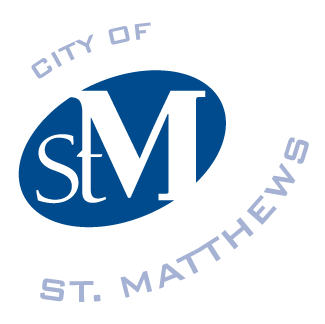
The mayor and city council members appreciate your interest in the City of St. Matthews recycling program and hope that you will participate consistently, as well as encourage others to participate in recycling. It is important that everyone does their part in keeping our environment green.
City of St. Matthews Recycling Program:
The City of St. Matthews has a comprehensive recycling program in place and it is available to all residents of the city for no additional fee. Note that some exceptions apply, such as residential apartments and duplexes.
To participate in the residential recycling program, you must place your recyclable items in a designated recycling cart, available by contacting the City of St. Matthews service provider, Rumpke.
Rumpke can be contacted between 8:00 a.m. and 5:00 p.m., Monday through Friday, at (800) 828-8171. The recycle cart must be set at the street edge, during your scheduled week, in front of your property, on the day of your schedule trash pick up. Only recyclable items should be placed in this cart. Do not mix with yard waste or trash. Rumpke will pick up the recyclables in a truck designated for the purpose of recycling. www.rumpke.com
Currently, accepted recyclable items are:
Soft plastic household bottles, jars or other plastic containers such as liter soda bottles ,salad dressing bottles, milk/water jugs or laundry/cleaning product containers
- All colors of glass from items such as juice, pop & soda bottles, water bottles, beer & wine bottles or food jars
- All metals such as tin food cans, aluminum & steel beverage cans, aluminum foil and pie pans and aerosol spray cans
- All paper and cardboard from items such as newspapers, drink boxes, milk & juice cartons, food boxes, cereal boxes, junk mail or other papers, magazines and corrugated cardboard.
Note: All food containers and aluminum should be rinsed, and free of food residue. Also, remove container lids and place in the trash. If possible, flatten any item and remove labels.
Do Not Include the following in your recycling items:
- Plastic bags, plastic containers used for motor oil, automotive products, paint, solvents, lawn care products, and chemicals
- Drinking glasses, dishes, mirrors or window glass, light bulbs or broken glass
- Cans used for chemicals or paints, appliances, power tools, batteries or clothes hangers
- Books or beverage cartons such as soft drink & beer cases
- Styrofoam
- Tires
- Batteries
- Fuel tanks
- Electronics
- Medical Waste
- Hazardous Chemical
- Fluorescent Lights
- Freon/Refrigerant

